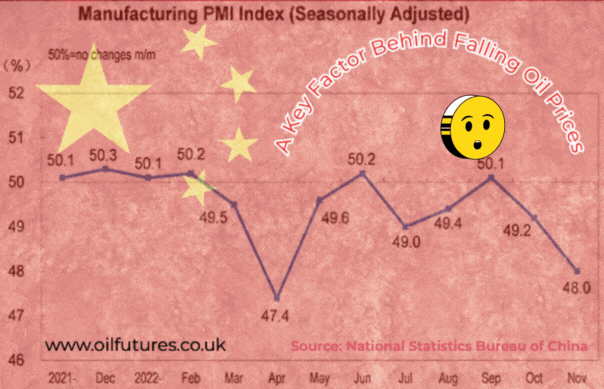The oil price that rose for two successive days before the weekend, only to fall back to where it was during the most part of last week, rose slightly on Monday when markets were open for business.
Since a massive US crude draw could not lift the prices of crude oil and sustain it, the rise we witnessed on Monday morning is going to be yet another flash in the pan - as far as the oil producers are concerned, of course.
Monday's oil price rally perhaps may have been prompted by the news that China is relaxing its rigid anti-Covid-19 measures that had resulted in sheer public inconvenience; it, in turn, has led to rare, sporadic protests around major industrial cities.
To its credit, China has been successful in curbing the spread of virus, though.
The measures, however, have taken its toll on the Chinese economy: its every major economic index has been in decline since June; in November alone, its Manufacturing PMI has fallen by 1.2% - a significant event.
Since China is the world's top importer of crude oil, the crude markets cannot underestimate the impact on them by the development; nor can they enjoy a misplaced optimism, as things cannot be reversed overnight to get back to where it was at the beginning of the year in the vast nation, with over a billion people.
As this is the case, there is no surprise why the corresponding markets catch colds, when China, the world's top crude importer, sneezes.
The ever growing political rift between China and the West - and the immediate neighbours of the former - does not help improve the situation either.
In this context, the fears of the onset of recessions in major economic power houses in the world and the slow growth in China are causing lingering pessimism among investors.
Against this backdrop, the OPEC+ made the right decision on Sunday during its virtual meeting; they agreed to keep the productions at the current level until they meet up in February.
Since the production cap imposed on Russian oil is not as bad as analysts first feared, the crude market will find a sensible equilibrium position on the pivot of the combined factor of supply-demand, defying the involvement of excessive analyses.
As of 10:50 GMT, the prices of WTI, Brent and LNG were at $81.58, $87.16 and $6.00 respectively.
The slight rise may be attributed to the fact that Russia would penalize the countries, which were instrumental in agreeing to setting a price cap on Russian oil.
On a positive note, as most factors that stemmed from the crisis in Ukraine, this too will slowly die down in proportion to the diminishing rhetoric of those who are involved in the crisis - directly or indirectly.







